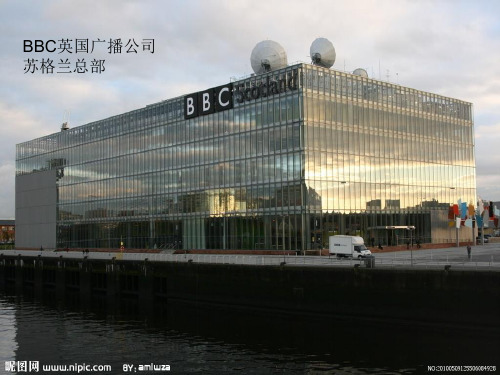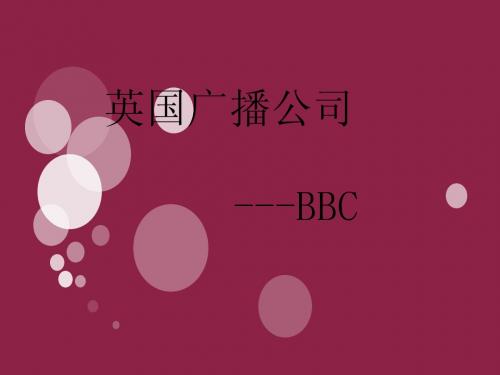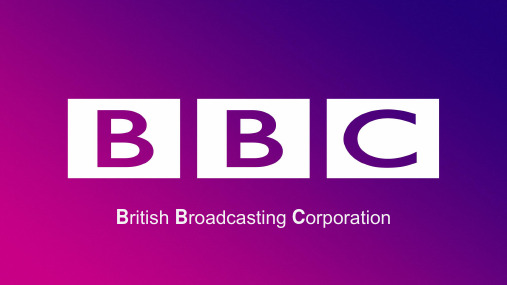BBC介绍 PPT
英国媒体简介ppt课件

全球发行量超过100万册,在西方主流社会中具有重 要影响力。
《新政治家》
政治类新闻杂志
专注于政治领域的报道和分析,涉及国内外政策、政治人物、国际 关系等。
创刊于1952年
以独特的政治视角和深入的分析评论为特点,在英国政治界具有较 高声誉。
发行量与影响力
在英国国内发行量较大,对英国政治生态具有重要影响。
起源与发展
英国媒体起源于16世纪的报纸和印刷术,逐渐发展成为 全球领先的媒体产业。
01
电视时代
20世纪50年代,英国电视业开始起步, 逐渐成为人们获取信息和娱乐的重要渠 道。
02
03
网络时代
20世纪90年代,互联网技术的发展使 得英国媒体进入了一个全新的时代, 各种网络应用如雨后春笋般涌现。
02
英国的主要报纸
观点。
03
专业化
英国媒体高度专业化,不同类型的媒体针对不同的受众群体。例如,一
些报纸和电视频道专注于政治和经济报道,而其他媒体则专注于娱乐、
体育或时尚等领域。
英国媒体的影响
社会影响力
英国媒体对社会发展具有重要影响。它们通过报道和讨论社会问题,引发公众关注并推动社会变革。 此外,英国媒体还对文化传承和创新产生积极影响,为人们提供了了解和欣赏不同文化的机会。
专业金融报纸
专注于金融领域的报道和评论,提供专业的金融市场分析和宏观 经济解读。
国际化视野
以国际化的视野关注全球金融市场和经济发展趋势,为读者提供 全球化的金融资讯。
高品质读者群体
拥有大量高净值、高学历的读者群体,以企业和金融界人士为主 。
《每日电讯报》
地方特色
以地方新闻和特色报道为主,关注地方政治、经济和文化发展, 具有较强的地方特色和文化底蕴。
BBC英国广播公司简介

BBC拥有较高声誉的原因:
• • • • 第一、非常讲究宣传报道的技巧。 第二、讲究时效性。 第三、开辟多种新闻来源。 第四、重视听众研究工作。
BBC影响力和声誉度下降
• 因素: 1、广播对象过分局限。 BBC的广播对象过分局限于国外的人士和精英阶 层,而对各国的特别是第三世界的普遍老百姓却 在意不够。 2、节目质量下降。 报道失实,节目造假,节目低俗化等。 3、政府提供经费不足 4、国际卫星传送网络和有线电视系统、新兴国际 互联网事业的巨大威胁。
BBC的发展历史
• 一、1922年——1927年元旦 • 1922年由政府资助但却独立运作的媒体BBC正式成立 初期开办的BBC,主要向大众播出戏剧、聊天、儿童通俗 节目与古典音乐等节目 ,以及少量的新闻消息。 1922年11月14 BBC的第一电视台分别从伦敦牛津街的赛 尔福里奇百货公司,伯明翰,曼彻斯特开始了广播,拉开 了BBC广播的序幕。 • 二、1927年元旦——1936.11.02 在运用里恩的构思后改组的BBC,还是只经营广播业,不 过在1932年BBC帝国服务(BBC Empire Service)开播 ,这是BBC第一个向英国本土以外地区广播的电台频道 。1938年,BBC阿拉伯语电台开播,这是BBC的第一个 外语频道。由此开始了对外广播的历史。 • 三、1932年BBC开始尝试电视传送 1936年11月2日BBC开始了全球第一个电视播放,开启了 电视业的历史。
BBC & CHINA
2008年4月,BBC对中国西藏问题进行不实报道,并多次散布谣言,引发中国
留学生抗议。
FIGHT FOR OUR BBC
英国广播公司为钱折腰偷做广告并与政府叫板
BBC的抗争
法新社资料照片:BBC董事 会主席戴维斯,他因凯利案向布莱 尔首相递交辞呈。
中文部和中文网简介英美概况-PPT文档资料

中文部和中文网简介
制作人:张萌萌 班 级:城市规划与建筑学院{环艺0Broadcasting Corporation 英国广播公司
简介;英国广播公司(British Broadcasting
Corporation),简称BBC,是英国的一家政府资助但却
独立运作的媒体,长久以来一直被认为是全球最受尊 敬的媒体之一。在相当长的一段时间内BBC一直垄断 着英国的电视、电台。在1955年独立电视台和1973年 独立电台成立之前,BBC一直是全英国唯一的电视、 电台广播公司。今天BBC除了是一家在全球拥有高知 名度的媒体,还提供其他各种服务,包括书籍出版、 报刊、英语教学、交响乐团和互联网新闻服务。
bbc中文网:是国际互联网络上一
个24小时不断更新的中文新闻时事 多媒体网站,与BBC的及其它语种 网站相辅相成,是BBC多语种、多 媒体网上报道的一个有机组成部分。
BBC 中文网 /chinese BBC 英文网
Thank you
BBC中文部于一九四一年五月成立,
现在每天有六个半小时的普通话节目和半小时 的广东话节目,此外还有一小时的《时事一周》 每星期日上午由香港电台转播。 中文部共有五十多名工作人员,除了主任, 数名行政和技术人员以及一位主持人外,都是 来自世界各地的华人。 为了便于听众来信,BBC在世界许多地方 设立了信箱。接到的信件全都转往伦敦总部的 听众关系部。这个部门每年收到的信件有五十 万封左右,负责答复和处理的工作人员来自世 界四十多个不同国家。
BBC英语学习软件
英国广播公司(British Broadcasting Corporation),简称BBC,成立于1922年,是英国 的最大的新闻广播机构,也是世界最大的新闻广播 机构之一。BBC在世界的各个角落用英语进行24小时 新闻广播,收听BBC新闻已成为英语学习者掌握英语 不可或缺的有效方式。
新闻课件 BBC

新老BBC 一、新老BBC
• 老bbc(商营): ):1922年12月14日,伦敦六家主 (商营): 年 月 日 要电器制造商集资创立了著名的英国广播公司。 要电器制造商集资创立了著名的英国广播公司。 政府为此成立了“收听委员会” 政府为此成立了“收听委员会”。 • 特点:1、性质:私营。 特点:1、性质:私营。 2、经费来源:出售收音机附加费及 、经费来源: 收听费。 收听费。 3、禁止广告。 、禁止广告。 4、只经营 、
五、BBC影响力和声誉度下降 影响力和声誉度下降
• 因素: 因素: 1、广播对象过分局限。 、广播对象过分局限。 BBC的广播对象过分局限于国外的人士和精英阶 的广播对象过分局限于国外的人士和精英阶 层,而对各国的特别是第三世界的普遍老百姓却 在意不够。 在意不够。 2、节目质量下降。 、节目质量下降。 报道失实,节目造假,节目低俗化等。 报道失实,节目造假,节目低俗化等。 3、政府提供经费不足 、 4、国际卫星传送网络和有线电视系统、新兴国际 、国际卫星传送网络和有线电视系统、 互联网事业的巨大威胁。 互联网事业的巨大威胁。
天线宝宝
BBC部分纪录片节目 BBC部分纪录片节目 BBC风云五十年 集) 风云五十年(2集 风云五十年 BBC.A.History.of.Britain.大不列颠史 英国史(15集) 大不列颠史/英国史 大不列颠史 英国史( 集 BBC.Journeys.to.the.Bottom.of.the.Sea.海底之旅 集) 海底之旅(6集 海底之旅 BBC.The.Blue.Planet.蓝色星球 集) 蓝色星球(10集 蓝色星球 BBC.Planet Earth.地球 集) 地球(5集 地球 BBC.The.Planets日月星宿 集) 日月星宿(8集 日月星宿 BBC.Pole.to.Pole极地之旅 集) 极地之旅(8集 极地之旅 BBC 古文明经典系列全集: 古文明经典系列全集: 宏伟金字塔的建造》 《BBC 宏伟金字塔的建造》(BBC.Building.The.Great.Pyramid) 《BBC 古代启示录 》(BBC Ancient Apocalypse ) 最后的一天》 《BBC 庞贝古城 - 最后的一天》(Pompeii - The Last Day) 罗马斗兽场- 死亡竞技场》 《BBC 罗马斗兽场 死亡竞技场》(Colosseum) 金字塔》 《BBC 金字塔》(Pyramid) 《BBC 尼罗河 》(Nile) 古罗马-一 《BBC 古罗马 一Empire) 金字塔拍摄花絮》 生命》 《BBC.金字塔拍摄花絮》 《BBC 生命》 金字塔拍摄花絮
BBC平台运营模式简介专题培训课件

运营监督考核管理
售后退换
客
投诉处理
服
整站操作日志
解决方案-业务流程
普通访问者
用户
网站访问
商品信息
促销信息 用户注册
店铺
入驻
信息录入
商品分类 检索浏览
店铺 检索浏览
活动浏览
商品展示/选购 售前客服
会员机制
否 登录
是
我的购物车
在线支付
供应商客服处理
订单提交 订单完成
发货配送 线下流程执行
信用评价
作为本行业的leading company,通过Veritrans的 Online B2C决算总额向着1兆日元冲击。
客户案例-vt
从2009年开始,Veritrans逐渐推出buy-j、jcb商城以 及ichiban-mall等国际化销售平台帮助日本商家直接将商品 卖到全世界各地。
特别是针对中国地区的客户,还支持银联以及支付宝支 付。通过运营这几个平台,Veritrans不但将其支付网关特 别是国际化结算业务进行了大规模的推广,同时也收获了更 多的运营收入。
4、通过订单处理模块以及对接第三方WMS系统实现供应商共同参 与的订单分派及发货流程(订单中的商品分别由对应的供应商发送 到运营商总仓,由运营商统一发送到客户手中)
5、通过完善的促销管理方式,实现促销参与自主化以及促销成本 自动分摊及记录功能,同时便于后期运营商与供应商的费用结算。
银联商城案例
2010年商派为“银联在线”()开发上线银联商城,以银 联卡支付作为唯一支付途径,为银联卡用户提供在线零售服务。
B2B2C平台运营模 式简介
目录
业务概述 业务特点及挑战 我们的解决方案 案例介绍
最新bbc介绍PPT汇总

…………
以王子之路为例
简介:这是一部纪录片,以威廉王子的成长 之路为例,向人们讲述了一个王子登上君王 的步骤。
王子之路
1. 节目涵盖了威廉王子从出生到成人的不同 阶段的影像资料。
2. 记录了不同的人对王子的成长之路的看法, 以及一个王子成为君王所要经历的艰难的 蜕变。
3. 主持人主持人
列表探索一下他们各自的节目和故事,应该会很 有看头。什么黄毛小厨师Jamie Oliver 退休国会 议员Michael Portillo 时政类老江湖David Dimbleby 等等 而且很多都是主持人自己写稿的(功底可想 而知) 有本讲伦敦的小书里就提过有个大学教授 因为在BBC当了纪录片主持人而人气暴涨…. (BBC 的男主持从小正太到老绅士应有尽有)
纪录片、游戏节目和肥皂剧,经常是英国 收视率最高的电视频道。BBC的主要新闻节 目也在BBC ONE播出,每天4次。 (6.00a,1.00p,6.00p,10.00p)
BBC旗下电视频道
英国:BBC第一频道,第二频道,第三频道,第 四频道,国会频道,新闻频道,CBBC,Cbeebies. (后面两个频道是儿童频道)
3. 通过威廉王子这一个个例,揭示了王室不 为人知的一面。
4. 对戴安娜和查尔斯的婚姻也做了分析和解 读。也分析了这对威廉的影响。
对《王子之路》的简单分析
1. 采用设定中心线法来发展整个片子。
2. 深度与广度兼具。有纵向来分析皇室,即 对历史上的国王和王储的典型事例的记录 和分析,也有从横向来分析皇室王子的状 况,即不同国家之间的比较,以及对威廉 王子的成长经历的描述。
1927年,BBC获得皇家特许状(Royal Charter of Incorporation),由理 事会负责公司的运作,理事会成员由政府任命,每人任期4年,公司日 常工作则由理事会任命的总裁负责。
BBC

培训是员工福利,对播音员、主持人也不例外; 延揽最优秀的播音员、主持人; 不拘一格的播音员、主持人选拔制度
返回
广播业务
现有5个全国性广播电台,听众达2700万;
有世界上影响最大的国际广播电台-BBC世界台; BC监听台:负责收听世界上140多个国家的 电台、电视台和通讯社播放的报道; 亚洲广播网:为务(BBC 则为西方世界公共 服务概念和公共传 媒提供了原则范式 与制度模式。)
返回
1、由来:
在BBC建立之前,已经有很多私人公司尝试在英 国做电台广播。根据1904年的无线电法案,英国邮 政局负责颁发电台广播牌照。1919年,由于收到很 多军队对过多广播而干扰军事通讯的投诉,邮政局 停止发出牌照。于是,1920年代初期,广播电台数 量骤减,越来越多人要求成立一个国家广播电台。 一个由无线电收音机制造商组成的委员会经过几个 月的讨论,最终提出一个方案,BBC由此诞生。
管理制度沿革
BBC的最高管理机构是 BBC理事会,其负责制定节目 标准,控制财政计划,进行 重大决策,确保节目传播的 平衡性与多样化,选定BBC总 裁,总裁在理事会的政策指 导与监管之下独立进行经营 管理活动。
依据2006年BBC新宪章, BBC理事会改为信托委员会, 其理事则变成受托者。BBC信 托委员会的执行机构是BBC执 行委员会。
1967年9月30日,BBC开始了BBC Radio 1电 台服务,以播送流行音乐为主。 1983年,BBC又第一个开播了早餐时间广播 服务《BBC早餐时间》,抢在了竞争对手的前 头。 1991年,BBC正式开始BBC全球新闻服务电 视频道,后在1995年1月更名为BBC World。 1998年8月,BBC的国内频道也开始采用卫 星播送,只要欧洲观众使用英国制造的卫星解 码器,他们也可以收看BBC1和BBC2。 返回
BBC-介绍PPT课件

The first, experimental television broadcast is made from Broadcasting House in 1932.
02 Part Two History
The Empire Service (precursor of the World Service) launches, broadcasting on shortwave in 1932
Coat of arms of BBC Motto
Part Two
History
02 Part Two History
1920 to 1922 The birth of British broadcasting
1923 to 1926 From private company towards public service corporation
The British Broadcasting Company (BBC) is formed in 1922 14 November – First BBC broadcasts from London (station 2LO). 15 November – First broadcasts from Birmingham (station 5IT) and Manchester (station 2ZY).
The BBC is established under a Royal Charter and operates under its Agreement with the Secretary of State for Culture, Media and Sport. Its work is funded principally by an annual television license fee which is charged to all British households, companies, and organizations using any type of equipment to receive or record live television broadcasts and iPlayer catch-up. The fee is set by the British Government, agreed by Parliament, and used to fund the BBC's radio, TV, and online services covering the nations and regions of the UK. Since 1 April 2014, it has also funded the BBC World Service(launched in 1932 as the BBC Empire Service), which broadcasts in 28 languages and provides comprehensive TV, radio, and online services in Arabic and Persian.
bbc简介

讲稿:世界范围内有多种广播电视管理制度。
所谓制度,就是人类社会为了更好地利用某种科学技术而创造的人、财、物的资源整合方式。
在美国是私营的商业广播电视管理制度,在我国是政党控制的国营广播电视管理制度,那除了这两种制度之外,又没有另外的制度呢?这就是英国的公共广播电视管理制度,这种制度的诞生与一个叫约翰里斯的人密切相关。
约翰里斯何许人也?为何他与这种制度的产生密切相关呢。
我们还是从头说起。
本周主要内容:BBC:世界上第一个公营广播公司创立过程1922年12月15日,6家电器制造商及数家小电器公司联合组建BBC。
它通过收听许可费获得生存和发展的利润。
但是,这种私人占有广播频率资源并经营获利的行为遭到了人们的质疑。
总经理约翰·里斯提出:应使广播免于商业机构和邮电部的控制,建立一个全国性的、社会性的、宗教性的、民主性的节目体系,使广播服务超越利润和娱乐的狭窄视野。
1926年12月31日,商营的BBC改组成公营的BBC(company-corporation)。
1927年正式播出节目。
1936年11月2日,BBC在伦敦市郊的亚历山大宫建成了世界上第一座正规的电视台。
约翰·里思的广播理念BBC的责任:把有关人类努力和成绩中的一切最美好的事情传达给最多的家庭。
立台三原则:即“以公共资金作为经费来源”,成为“独立的和垄断的公共服务机构”,要“以利他主义思想为从业者的行为准则,把为公众利益而工作视为自己的天职”。
受众:极少有听众知道自己想要什么,更少有听众想要他们所需要的。
商业广播电视:有的人为公众提供一些他认为公众需要的东西,并以此为荣。
这种人经常杜撰一些低水准的公众需求,而自己还对此洋洋自得。
雇员:剑桥牛津高材生文化:精英文化BBC公营广播电视所倡导的原则1、由里斯原则发展到现在的公营广播电视原则:第一,广播电视必须为所有的公众服务,要播出各种类型的节目,不仅要满足多数人的需求,也要满足少数阶层的需求;第二,广播电视是一种极其重要的传播媒介,具有重大社会作用,因而不能以商业利润为导向,经营者必须对国家、社会和公众承担责任和义务,如维护国家安全、提倡高尚的社会道德与风气、提高公众教育水平、加强民族认同、给予儿童和青少年正确向上的引导,保证多元文化,等等;第三,广播电视必须坚持独立的编辑原则,不受政治、党派和商业利益左右,坚持公正、客观、平衡的报道原则;第四,广播电视工作者必须具有良好的职业道德,要有高尚的道德观念和责任感,使命感。
【精品】BBC《全景》栏目发展史ppt幻灯片

《全景》:曾经的王牌节目受冷 落
然而,“全景”节目近年来却被越来越多的英国观众所冷落。 据BBC官方网站介绍,“全景”节目题材的枯燥无味多年来 一直是BBC的顽疾,为提高收视效果,其播出时间屡被调整, 但收视率一直平平,2007年后,“全景”节目在几经裁撤风 险后被保留下来。然而,英国最大的媒体节目收视调查网站 SPY DIGITAL今年9月9日公布的数据显示,节目全国收视率 仍在10%徘徊,观看人数比竞争对手节目少一半。英国媒体 认为,过去10年里,该栏目总是试图从两方面找话题:国内 公共福利的种种弊端以及他国存在的民主或人权争议。英国 独立电视台的新闻时事记者伊恩对《环球时报》记者说, “全景”过于紧跟政党提出的议程话题,一再报道英国街头 暴力、毒品交易等,但英国老百姓都知道这是老调重弹,也 无法在任何一届政府得到根治。对于“全景”热衷的另一类 题材:他国民主、人权问题,伊恩说,“全景”的拍摄越来 越失去客观角度,一味追求话题的新颖,这让该节目失去了 不少老观众。
《全景》57年全记录
看word文档
结束语
谢谢大家聆听!!!
18
全景门事件
去年8月,BBC的《全景》栏目播放了一部通过暗访 拍摄的节目。片中BBC记者乔装成为伦敦申办2012 年夏季奥运会拉选票的商人,通过体育经纪人塔克 齐认识了斯拉夫科夫,而斯拉夫科夫对出手阔绰的 商人毫无戒备,于是在片中人们清楚地看到他们饶 有兴致地谈论如何买通国际奥委会委员,投伦敦的 票。节目播出后引起了强烈反响,斯拉夫科夫赶忙 把自己描绘成了一个“卧底”的特工,说是想将计 就计揪出向国际奥委会行贿的人。但是,国际奥委 会显然不承认他的说法,决定暂时终止斯拉夫科夫 的国际奥委会委员资格,并禁止他前往希腊观看雅 典奥运会。
- 1、下载文档前请自行甄别文档内容的完整性,平台不提供额外的编辑、内容补充、找答案等附加服务。
- 2、"仅部分预览"的文档,不可在线预览部分如存在完整性等问题,可反馈申请退款(可完整预览的文档不适用该条件!)。
- 3、如文档侵犯您的权益,请联系客服反馈,我们会尽快为您处理(人工客服工作时间:9:00-18:30)。
In 1927,The British Broadcasting Company becomes the British Broadcasting Corporation, when it is granted a Royal Charter. Sir John Reith becomes the first Director-General. Motto
British Broadcasting Corporation
Contents
01 Introduction 02 History
03 Services
Part One
A brief introduction of BBC
01 Part One Introduction
The British Broadcasting Corporation (BBC) is a British public service broadcaster. Its headquarters are at Broadcasting House in London and is the world's oldest national broadcasting organization and the largest broadcaster in the world by number of employees.
Britain's first live public broadcast from the Marconi factory in Chelmsford took place in June 1920. The Melba broadcast caught the people's imagination and marked a turning point in the British public's attitude to radio.
The first, experimental television broadcast is made from Broadcasting House in 1932.
02 Part Two History
The Empire Service (precursor of the World Service) launches, broadcasting on shortwave in 1932
ห้องสมุดไป่ตู้
BBC moved much of its radio operations out of London, initially to Bristol, and then to Bedford. Bedford was the studio for the daily service from 1941 to 1945.
Coat of arms of BBC Motto
Part Two
History
02 Part Two History
1920 to 1922 The birth of British broadcasting
1923 to 1926 From private company towards public service corporation
Television broadcasting was suspended from 1 September 1939 to 7 June 1946, during the Second World War, and it was left to BBC Radio broadcasters to keep the nation's spirits up.
The BBC is established under a Royal Charter and operates under its Agreement with the Secretary of State for Culture, Media and Sport. Its work is funded principally by an annual television license fee which is charged to all British households, companies, and organizations using any type of equipment to receive or record live television broadcasts and iPlayer catch-up. The fee is set by the British Government, agreed by Parliament, and used to fund the BBC's radio, TV, and online services covering the nations and regions of the UK. Since 1 April 2014, it has also funded the BBC World Service(launched in 1932 as the BBC Empire Service), which broadcasts in 28 languages and provides comprehensive TV, radio, and online services in Arabic and Persian.
BBC opens the world's first regular high-definition television service in 1936
In 1938 BBC begins broadcasting its first foreign-language radio service, in Arabic.
The British Broadcasting Company (BBC) is formed in 1922 14 November – First BBC broadcasts from London (station 2LO). 15 November – First broadcasts from Birmingham (station 5IT) and Manchester (station 2ZY).
